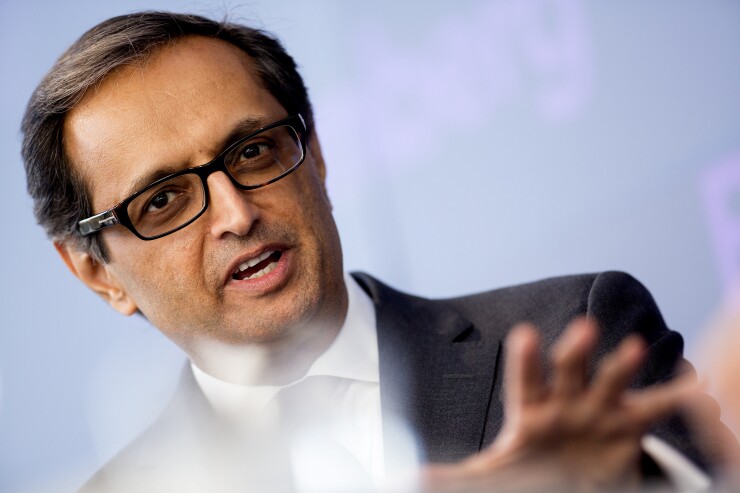Receiving Wide Coverage ...
Goldman handshake: Pablo Salame and Isabelle Ealet, two of three executives who oversee Goldman Sachs’ securities division, are retiring from the bank next month, leaving Ashok Varadhan as the sole head of the unit. The division “typically
Their departure caps “a period of turmoil for a division that was once the bank’s biggest and most powerful growth engine” but which “has struggled more than peers such as JPMorgan Chase, Citigroup and Bank of America,” the Financial Times adds. The fact that the two executives, both of whom are in the early or mid-50s, are retiring “underscores the
Wall Street Journal
Back in the game: The Orogen Group, the investment firm headed by former Citigroup CEO Vikram Pandit, is

Hearing on the Hill: Richard Clarida, President Trump’s nominee to be vice chair of the Federal Reserve, will tell the Senate Banking Committee Tuesday that financial regulatory policies should “preserve the far greater resiliency and stability of the financial system that has been achieved as a
But Fed nominee Michelle Bowman, who would represent community banks on the panel, is expected to
Opening soon: GreenSky, the 12-year old financial technology company that operates a lending platform in which banks make loans to merchants, is planning to go public with an equity offering that would
Not interested: Steve Eisman, the money manager who made a fortune betting on the housing collapse, portrayed in “The Big Short,” isn’t placing any bets on cryptocurrencies. “I don’t see the purpose of it,” he said at a conference in Hong Kong. “
Watching Mr. Big: The situation involving Barclays CEO Jes Staley, who was penalized $1.5 million for trying to unmask a whistleblower at the bank, points out the need for corporate boards to be aware of misconduct in the C-suite. “Nobody else controls the C-suite,” said Scott Killingsworth, a compliance attorney. “
New York Times
Impact investing: The upcoming emergence from bankruptcy of Remington Outdoor, one of the oldest and largest gun manufacturers, offers an opportunity for commercial banks to make a “social impact” by backing an investor “willing to buy Remington with a plan to transform the company into the most advanced and responsible gun manufacturer in the country,” columnist Andrew Ross Sorkin suggests. “They could create a profitable model for the rest of the industry using technology and sound sales policies to
Bank of America, which has a big social impact policy, “could be a perfect candidate to take a piece of Remington,” he suggests. JPMorgan Chase also “has been a big proponent of impact investing.”
Quotable
“I have witnessed firsthand how the regulatory environment created in the aftermath of the crisis has disadvantaged community banks. If confirmed, I will bring this perspective to my work at the Board to ensure that rules preserve the resiliency of the financial system, but are





